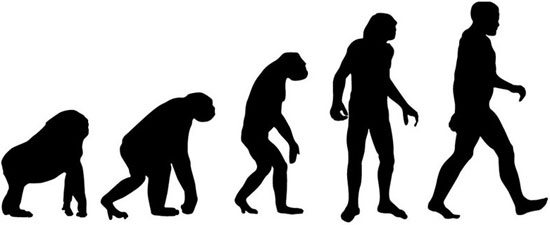Why don't all primates evolve into humans?
Prior to the widely accepted hypothesis that humans now originate from ancient gibbons. Many people ask the question: Why do gibbons still exist today and why other primates , including gibbons, have not evolved into humans?
According to experts, humans do not evolve from gibbons, gorillas or chimpanzees. In fact, all are modern species that have undergone different evolutionary paths, although humans have common ancestors with some other primates such as African gorillas.

The human evolutionary schedule is long and controversial, with many important loopholes. (Photo: Life Little Mysteries)
The human evolutionary schedule is long and controversial, with many important loopholes. Until now, scientists have not agreed on many starting and ending points of countless species. Therefore, evolutionary timetables often include key conjectures.
If people say "evolving" more than their furry relatives are inaccurate.
The idea that a species evolved to survive is like "using a horse rickshaw" . Gene mutations always occur, are not loud and often do not come with any measurable changes in the lifestyle of the organism. In general, the most likely mutations passed down to future generations are mutations that prove useful for the survival of individuals or species.
The usefulness of a mutation depends mainly on changing environmental factors such as food, predators, climate and social pressure. The African or gibbon species still exist today because their environment facilitates the successful reproduction of individuals with our different genetic material.
In short, evolution is a continuing "trial and error" process and all primates are part of it .
- Why do primates still exist and not evolve into humans?
- Secrets of human life expectancy
- Bonobo is very close to humans
- Detecting the last ancestral fossils of humans and monkeys
- Discover 3 specific genes that help us evolve into humans!
- The human brain continues to evolve
- The monkey is also the same as the old man
- Humans are originally from Asia?
- New fossils show primates that have ancestors in Asia
- Recreate the most ancient primates of Earth
- Announced 25 most endangered primates in the world
- The way the primates' brains look
 'Fine laughs' - Scary and painful torture in ancient times
'Fine laughs' - Scary and painful torture in ancient times The sequence of numbers 142857 of the Egyptian pyramids is known as the strangest number in the world - Why?
The sequence of numbers 142857 of the Egyptian pyramids is known as the strangest number in the world - Why? History of the iron
History of the iron What is alum?
What is alum?